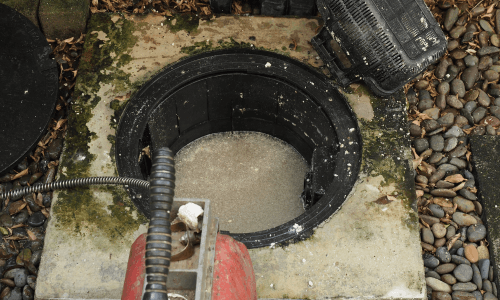
Main Sewer Line Clog Symptoms + Causes | Prevention Tips
A clogged main sewer line is a serious plumbing issue that can lead to significant damage and costly repairs if not addressed promptly. The main sewer line is responsible for carrying wastewater from your home to the municipal sewer system or septic tank. When it becomes clogged, it can cause a range of problems throughout your plumbing system. In this comprehensive guide, the experts at Local Plumber in Florida will help you identify the key symptoms of a main sewer line clog and provide guidance on how to address the issue.Understanding the Main Sewer Line
Before diving into the symptoms of a clog, it’s important to understand the role of the main sewer line:- Function: The main sewer line collects wastewater from all the drains in your home and transports it to the municipal sewer system or septic tank.
- Material: Main sewer lines are typically made of PVC, cast iron, or clay. Each material has its own lifespan and potential issues.
- Location: The main sewer line is usually located underground, running from the house to the street or septic system.
Symptoms of a Main Sewer Line Clog
Recognizing the symptoms of a main sewer line clog early can help you address the problem before it escalates. Here are the key signs to watch for:1. Multiple Fixtures Backing Up
- Description: If several fixtures in your home, such as toilets, sinks, and bathtubs, are experiencing backups or slow drainage simultaneously, it could be a sign of a main sewer line clog.
- Cause: A clog in the main sewer line can cause a backlog of wastewater, affecting multiple fixtures throughout the house.
- Action: If you notice this issue, avoid using the affected fixtures and contact a professional plumber for an inspection.
2. Toilets Overflowing
- Description: An overflowing toilet can be a common sign of a main sewer line clog. If your toilet overflows even after using a plunger, it may indicate a deeper blockage.
- Cause: A clogged main sewer line can prevent wastewater from flowing properly, leading to toilet overflows.
- Action: Avoid flushing the toilet and seek professional help to clear the main sewer line.
3. Slow Drains Throughout the House
- Description: If you notice that multiple drains in your home are slow, it could be a symptom of a main sewer line clog.
- Cause: A blockage in the main sewer line can restrict water flow, causing slow drainage in various fixtures.
- Action: Try to determine if the issue affects all drains or just specific ones. Contact a plumber to diagnose and address the problem.
4. Foul Odors
- Description: Unpleasant smells coming from your drains or yard can indicate a problem with your main sewer line.
- Cause: A clogged sewer line can cause sewage to back up into your home or yard, leading to foul odors.
- Action: If you detect strong odors, avoid using the affected fixtures and contact a plumber to inspect the sewer line.
5. Gurgling Sounds
- Description: Gurgling or bubbling noises coming from your drains or toilets can be a sign of a main sewer line clog.
- Cause: Air trapped in the pipes due to a blockage can create gurgling sounds as wastewater struggles to pass through.
- Action: Pay attention to the frequency and location of these sounds. A professional plumber can help diagnose and resolve the issue.
6. Sewer Backup in the Yard
- Description: If you notice sewage or wastewater pooling in your yard, it could be a sign of a main sewer line problem.
- Cause: A severe clog or blockage can cause sewage to back up into the yard, leading to unpleasant and unsanitary conditions.
- Action: Avoid contact with the affected area and contact a plumber immediately to address the issue.
7. Tree Root Intrusion
- Description: Visible signs of tree roots invading your sewer line can indicate a potential clog or blockage.
- Cause: Tree roots can grow into and obstruct sewer lines, causing clogs and reducing flow.
- Action: If you suspect tree root intrusion, consult a professional plumber who can use specialized tools to remove roots and repair the line.
Causes of Main Sewer Line Clogs
Understanding the causes of main sewer line clogs can help you prevent future issues:1. Grease and Fat
- Description: Pouring grease, fat, or oil down the drains can lead to clogs in the sewer line.
- Prevention: Avoid disposing of grease or fat in your sink. Instead, collect it in a container and dispose of it properly.
2. Tree Roots
- Description: Tree roots seeking moisture can invade sewer lines, causing blockages.
- Prevention: Regularly inspect your yard for tree root intrusion and address any issues promptly.
3. Foreign Objects
- Description: Items such as paper towels, sanitary products, and small toys can cause clogs if flushed down the toilet or washed down the sink.
- Prevention: Dispose of non-flushable items in the trash and educate household members on proper disposal practices.
4. Pipe Damage
- Description: Cracked or damaged pipes can lead to clogs and blockages.
- Prevention: Schedule regular plumbing inspections to identify and address potential pipe issues.
5. Inadequate Pipe Slope
- Description: Pipes that are not properly sloped can cause waste to collect and form clogs.
- Prevention: Ensure that pipes are installed with the correct slope and pitch to facilitate proper drainage.
How to Address a Main Sewer Line Clog
If you suspect a main sewer line clog, here are the steps to take:1. Avoid Using Affected Fixtures
- Description: Stop using toilets, sinks, and other fixtures that are affected by the clog to prevent further backups and damage.
2. Inspect for Visible Issues
- Description: Check for visible signs of blockages, such as water pooling in the yard or gurgling sounds from drains.
3. Use a Plumber’s Snake or Auger
- Description: A plumber’s snake or auger can help break up and clear minor clogs in the sewer line.
- Action: Use the tool according to the manufacturer’s instructions. If you’re not comfortable using it, consult a professional plumber.
4. Consider a Chemical Drain Cleaner
- Description: Chemical drain cleaners can sometimes help dissolve clogs, but they should be used with caution.
- Action: Follow the product instructions carefully and avoid overuse, as excessive chemical use can damage pipes.
5. Schedule a Professional Inspection
- Description: If the clog persists or if you’re unable to address it yourself, contact a professional plumber for an inspection.
- Action: A plumber can use specialized tools, such as a sewer camera, to diagnose and address the issue effectively.
Preventive Measures to Avoid Future Clogs
To prevent main sewer line clogs and maintain a healthy plumbing system:1. Regular Maintenance
- Schedule Inspections: Have your plumbing system inspected regularly by a professional plumber to identify and address potential issues early.
- Clean Drains: Regularly clean drains and remove debris to prevent clogs from forming.
2. Proper Disposal Practices
- Avoid Grease and Oil: Never pour grease, fat, or oil down the sink.
- Dispose of Non-Flushable Items: Properly dispose of items like paper towels, sanitary products, and other non-flushable materials.
3. Tree Root Management
- Inspect Your Yard: Regularly check for signs of tree root intrusion and address any issues promptly.
- Root Barriers: Consider installing root barriers to prevent tree roots from invading sewer lines.
4. Pipe Care
- Monitor Pipe Condition: Regularly inspect pipes for signs of damage or corrosion.
- Maintain Proper Slope: Ensure that pipes are installed with the correct slope to facilitate proper drainage.
Conclusion
Recognizing and addressing the symptoms of a main sewer line clog is crucial to maintaining a healthy and functional plumbing system. By being aware of the signs, understanding the causes, and taking preventive measures, you can avoid costly repairs and ensure that your sewer line remains in good condition.
For expert plumbing services and advice in Florida, trust the experienced team at Local Plumber. We’re here to help with all your plumbing needs, from diagnosing and resolving sewer line clogs to providing comprehensive solutions for all your home’s plumbing challenges. Email us at services@local-plumber.com or call us at (833) 247-7667 (POOP).




